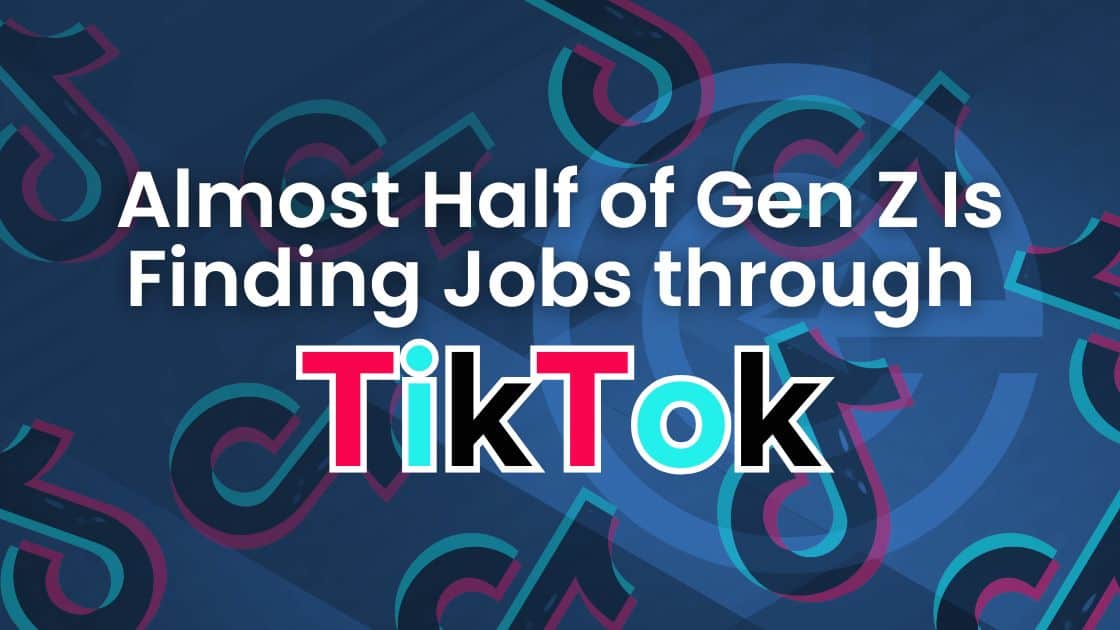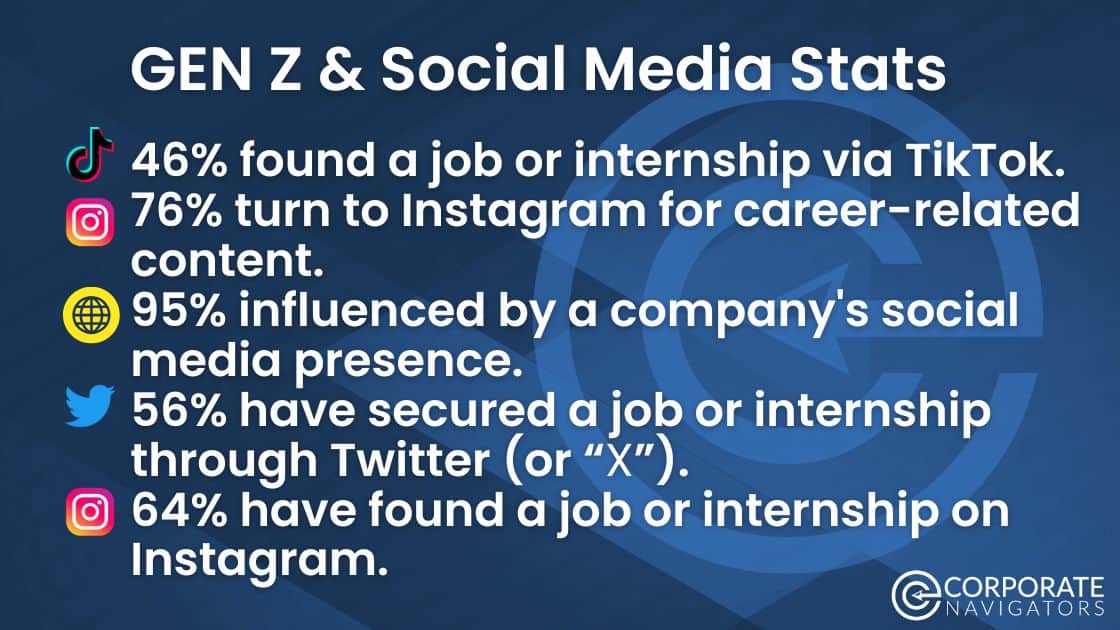
Table of Contents
Almost Half of Gen Z Landing Jobs through TikTok
Is social media like TikTok the stomping grounds for young career seekers? The latest data from Zety® and other studies say yes.
Zety®, a career service focused on helping individuals enhance their resumes and cover letters, has recently unveiled its 2025 Gen Z Career Trends Report. This comprehensive survey, conducted with nearly 900 Gen Z workers, explores how social media—particularly TikTok—is influencing career choices and job search tactics for the generation that grew up in the digital age.
Key Findings
In Zety’s report, young professionals give valuable insights about how they leverage social media to navigate the modern job market. Here are some of its crucial findings.
- 46% of Gen Z have landed a job or internship via TikTok.
- 76% turn to Instagram for career-related content, more than double the 34% who use LinkedIn.
- 95% say a company’s social media presence influences their decision to apply.
- 56% have secured a job or internship through Twitter or X.
- 64% have found a job or internship on Instagram.
Additional Insights
Supplemental studies affirm trends identified in Zety’s survey. HR Review cites that 73% of job seekers between the ages of 18-34 found their jobs through social media. Additionally, social media is significantly influencing how Gen Z approaches their careers. Specifically, 68% of Gen Z workers turn to social media platforms to explore career opportunities and map out their professional paths.
Social Media Reshaping Career Decisions and Trends
For better or for worse, platforms like TikTok are influencing career choices and job search strategies for the first generation to fully grow up online. Specifically, social media has become a major platform for career advice and trends among Gen Z, offering a blend of valuable insights and controversial guidance.
While career influencers can introduce fresh career trends, all this content comes with a caveat: potential misinformation. Without fact checking or vetting sources, influencers can spread misleading advice that can impact workplace decisions.
Some trends that have proliferated social media have disrupted traditional workplace norms. For instance, Gen Z has widely embraced trends such as job hopping, frequently switching jobs for better opportunities, and career cushioning (seeking backup options while employed). Quiet quitting—only doing the bare minimum at work—and Bare Minimum Monday, which emphasizes minimal effort to avoid burnout, are also gaining popularity.
Furthermore, Gen Z has adopted concepts like “act your wage” to establish boundaries based on pay and “rage applying,” where frustration leads to sending out numerous job applications. For obvious reasons, these kind of trends shake the foundation of what it means to have a successful career path and provoke much thought.
On the positive side, young professionals can share best practices and ideas easily to educate and inspire their peers. At a glance, this list of up and coming professional influencers provide advice on everything from entrepreneurship to becoming a better leader at work. Gen Z is tapping into these resources as well, which are certainly positive influences for individuals who seek new ideas and thought leadership to maximize one’s potential.

The Most Prepared Generation Yet?
Gen Z is not only spending more time on social media to shape their career paths, but they are also leading the way when it comes to investing in formal career training. According to HR Review, both Gen Z and Millennial workers are dedicating more time, money, and effort to career development through formal education compared to older generations.
Approximately 26% of Gen Z and 28% of Millennials have pursued career training through university, college, or apprenticeships. In comparison, only 17% of Gen X and 15% of Baby Boomers have taken similar educational routes. Leveraging formal career training in their development more than their predecessors is just another factor that differentiates Gen Z professionally.
Social Media Presence: More Important than Ever
There’s no way around it: Gen Z is a digitally native generation. More than half of them (54%) spend at least four hours a day on social media. Therefore, a strong social media strategy is unavoidable if you want to attract and recruit top talent.
Developing a strong and positive company brand image is vital for attracting Gen Z talent, as they assess potential employers based on transparency, values, and workplace culture. With 78% of Gen Z believing that social media profiles are an important part of their evaluation, it’s crucial to maintain a polished, professional online image as well.
For Gen Z, managing their personal brand on social media is not only a key strategy for career advancement, but also a reaction to the increasing influence of career influencers on shaping professional standards and expectations. Staying fresh and relevant online will make the best impression to this generation, maximizing your recruitment strategy.
Engaging with a Fully Digital Generation
Social media, especially platforms like TikTok and Instagram, has become a powerful tool for Gen Z in navigating the job market and shaping their careers. With 46% of Gen Z landing jobs or internships through TikTok and 76% using Instagram for career-related content, it’s clear that businesses must embrace a strong social media presence to attract this digitally native generation.
Additionally, Gen Z is leading the charge in investing in formal career training, outpacing older generations in their commitment to education and skill development. As this generation increasingly relies on social media for job opportunities and career advice, companies must prioritize a positive, transparent online presence to appeal to Gen Z’s values and professional standards. To stay competitive in recruiting top talent, businesses need to stay relevant and visible in the digital spaces Gen Z frequents.



